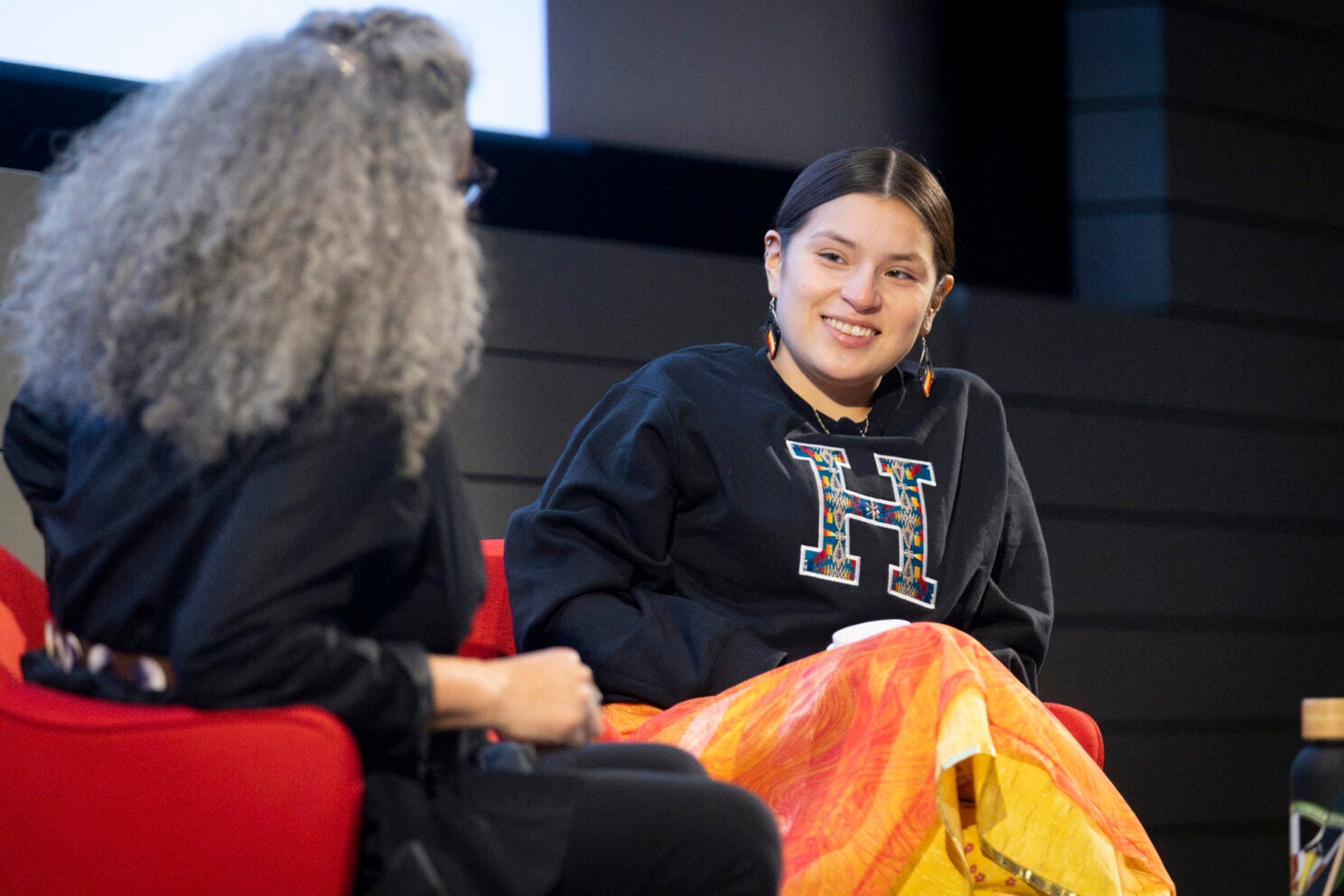For all the other Willie Jacks

Siobhan Brown (left) talks with Paulina Alexis, who played the role of Willie Jack in “Reservation Dogs.”
Niles Singer/Harvard Staff Photographer
‘Reservation Dogs’ star Paulina Alexis offers behind-the-scenes glimpse of hit show, details value of Native representation
Paulina Alexis has made audiences laugh, cry, and fall in love with Willie Jack, her character on “Reservation Dogs.” The critically acclaimed and award-winning TV comedy revolves around the lives of four teenage friends on an Oklahoma reservation as they attempt to save enough money to move to California.
Alexis talked about the importance of representation and offered a behind-the-scenes perspective of the show Thursday evening with an animated crowd at the Harvard University Native American Program’s annual lecture. Among the TV clips shared was a powerful scene she had with co-star and Oscar nominee Lily Gladstone’s character Hokti as they pray to ancestral healers for guidance.
“This was probably one of my challenging things from not just ‘Reservation Dogs’ but in general. At the time, I was so homesick during Easter. I was homesick for my family, who were all home having feasts,” Alexis said. She was having a particularly hard time in the wake of a cousin’s death and relied heavily on Gladstone during the heart-wrenching scene.
“It didn’t take me much to cry, those tears are very real. I felt a lot of my past relatives with me that day,” she added. “Lily really helped me. She helped me run lines because I couldn’t even remember them.”
Alexis shared the stage at Menschel Hall with Siobhan Brown, a citizen of the Mashpee Wampanoag Tribe and lecturer at Brown University. Brown asked the 23-year-old actor, a member of the Stoney tribe in the Alexis Nakota Sioux Nation, why Native representation in media is important to her.
Growing up in Alberta, Canada, Alexis said she often didn’t see herself in the characters portrayed on screen, so she was eager to get the chance to provide that representation herself. At 19, she landed the role of Willie Jack, a character originally written as a boy.
Jordan Clark, assistant director of HUNAP, noted that Alexis is already giving young Natives the representation they deserve. “Bringing Paulina this year was a really amazing opportunity not only because of all that she’s accomplished, but also because it was really impactful for our students to see somebody close in their age who’s achieved so much,” he said after the lecture.
Karen Medina-Perez ’24, a student at the Harvard Extension School and active member of Natives at Harvard College, is a big Alexis fan. “It was amazing to hear Paulina speak about her experiences as an actress and her connection to her home and family,” Medina-Perez said.
Efforts have grown in recent years to amplify Indigenous representation in Hollywood, with “Reservation Dogs” being a prime example of Indigenous-led storytelling, acting, and producing. The vast majority of the cast were Native Americans, and the show’s co-creators were Sterlin Harjo, a member of the Seminole and Muscogee nations, and Taika Waititi, whose late father was Maori. Harjo was also the showrunner.
These efforts can help support the revitalization of Indigenous languages, Alexis noted, pointing to Marvel’s usage of Mohawk in an episode of “What If.”
“A lot of us don’t even know our languages,” the First Nations actor said. “I can understand my language, but I don’t speak it fluently as much as I should.”
Medina-Perez added: “For so long, our portrayal has been negative and centered on stereotypes. Our stories were never written by our people and characters were played by white actors. Not including us reinforces the false narrative that we disappeared or died off. Now we’ve taken over the narrative. We are here. We have always been here, and we will continue to be here.”
After three seasons, Harjo chose to end the series, and though Alexis plans to take time off, she hinted at future voice-acting projects.
Alexis praised HUNAP for their work providing a space for Native students at Harvard.
Clark said of the young actor: “She’s always happy to help inspire the next generation of Indigenous artists and leaders. To be proud of their heritage.”




